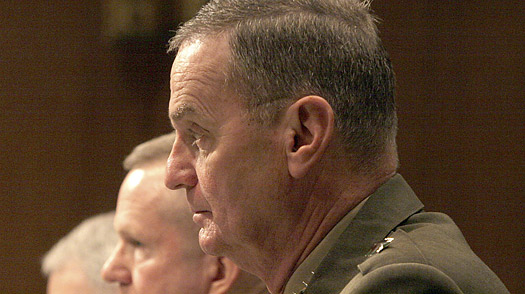
The most surprising thing about President-elect Obama's pick of James Jones Jr. to serve as his national security adviser isn't that he's a retired four-star Marine general. It's that Jones is a longtime friend of Senator John McCain, the man Obama defeated to win the White House. While many prior Democratic national security advisers — think Anthony Lake under Clinton — have been academics or policy wonks, Obama's choice of Jones highlights his centrist tendency and his willingness to confound his party. It will be Jones' job to serve as a foreign-policy broker for the President, funneling to Obama his assessment of how to best reconcile the conflicting views of the State Department, Pentagon, and other elements of the U.S. government's international actors.
Fast facts:
• Jones was born December 19, 1943, in Kansas City, Mo., but lived for much of his youth in France, where his father sold farm machinery.
• He stands 6 ft. 4 in. and played forward on Georgetown University's basketball team, which could be another reason Obama tapped him.
• Jones' 40 years in a Marine uniform began as a platoon commander in Vietnam and ended with a pair of plum assignments — commander of the Marine Corps and NATO military chief. He retired from the Corps in 2007.
• Since leaving the Corps he's spent time formally assessing the capabilities of the Iraqi military as well as trying to figure out where U.S. policy has gone wrong in Afghanistan.
• Served as the Marines' top lobbyist in the Senate during the early 1980s — where his first boss was Navy Captain John McCain.
• Helped bring humanitarian aid to the Kurds in northern Iraq, and calm to Bosnia, in the early 1990s.
• Has served in politically sensitive roles as a top aide to the Marine commandant in the late 1980s and as military assistant to Defense Secretary William Cohen in the late 1990s.
• From 2003 to 2006, he was the first Marine to serve as SACEUR — Supreme Allied Commander, Europe.
• Since leaving the Corps, Jones has worked on energy issues as head of the U.S. Chamber of Commerce's Institute for 21st Century Energy and served on the boards of Boeing and Chevron.
• Married, one daughter, three sons.
Quotes about:
"He's like [General Dwight D.] Eisenhower, who belonged to no camp and everyone wanted him." — Democratic House leader Steny Hoyer on Jones' political attractiveness (The Wall Street Journal, April 23, 2007).
"He provides a nonpartisan standard for the national interest — that would be the presumption given his previous experience." — Retired Army General Wesley Clark (The Washington Post, Nov. 21, 2008).
"National Review Online calls the idea of Jones at the NSC 'a pretty good sign for hawks, a pretty bad sign for doves,' which just about sums it up." — (The Nation, Nov. 23, 2008).
"He gets to the heart of an issue very quickly and does it in a way that is very inclusive of everybody around him." — Retired Marine General Peter Pace, who has known Jones for 38 years, in an Associated Press profile on Jones (Nov. 27, 2008).
Quotes from:
"The Joint Chiefs have been systematically emasculated by Rumsfeld. You should not be the parrot on the secretary's shoulder." — What Bob Woodward reports Jones told fellow Marine General Peter Pace in 2005 before Pace became Chairman of the Joint Chiefs of Staff (in Woodward's book, State of Denial).
"I personally don't believe that the United States can afford to be perceived as having not been successful in either Iraq or Afghanistan, and I think the consequences for such a perception or such a reality will be with us for years to come in terms of our ability to be a nation of great influence in the 21st century." — Testifying before the Senate Armed Services Committee (Sept. 6, 2007).
"I wanted to share a story that may be a true story, about an Air Force captain who narrowly escaped serious injury recently — this is from a newspaper clip that I found this morning — when he decided to try horseback riding, even though he had never had any lessons or any prior experience. So he mounted the horse unassisted, and the horse immediately sprang into action. As it galloped along at a steady and rhythmic pace, the captain began to slip from the saddle. In terror, he grabbed for the horse's mane, but he couldn't get a firm grip. He tried to throw his arms around the horse's neck, but he began to slide down the side of the horse anyway as his head was being battered against the ground and he was moments away from unconsciousness, to his great fortune a Marine sergeant who was shopping at Wal-Mart saw him and quickly unplugged the horse." — Jones, who acknowledges he enjoys tales of rivalry among the nation's military services, while speaking to the Atlantic Council (Sept. 12, 2007).
"It's been my experience and my observation that what is happening in Afghanistan is a loss of momentum in terms of addressing the issues of narcotics, which permeates the society, corrupts a generation of Afghans, prevents the legitimate growth of economic reform and, perhaps more insidiously, funds the insurgency by virtue of the tremendous revenues that they're able to generate — and it certainly prevents the influence of the government from expanding." — Testifying before the Senate Foreign Relations Committee, on the lack of progress the U.S. and its allies are achieving in Afghanistan (Jan. 31, 2008).
"I'm troubled by the fact that the largest proportional increase in suicide bombings is, in fact, in Pakistan now, not in Afghanistan nor in Iraq. And usually that's the precursor of worrisome things." — Testifying before the House Foreign Affairs Committee, detailing Pakistan's increasing problems (May 7, 2008).